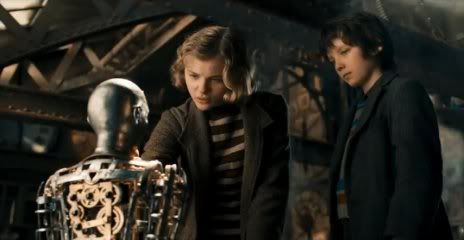Everything has a purpose. Even machines.

As the year winds down, it definitely feels like I'm making up for lost time since I've now seen my fifth film in theaters this month (and I may very well double that number while I'm home for the holidays). Today's outing was to see Martin Scorsese's Hugo, which I caught in 3-D because I was assured that it was integral to many of the scenes. And so it was, but I had the misfortune to be seated in close proximity to a girl who spent the first few minutes pointing out every 3-D effect. "Look at the snow!" she cried, and I wondering how long it would be before the novelty wore off. Thankfully, the answer was "not very" and I was able to enjoy the rest of the film in relative peace.
While I liked Hugo a good deal, I'm afraid it never quite tripped over into love for me. Sure, Scorsese's unbounded enthusiasm for cinema is evident in every single frame, and he's able to elicit fine performances from his cast, but the whole enterprise moves a bit too slowly for my tastes and too much of the plot is predicated on characters keeping secrets. Then again, the one being kept by precocious urchin Hugo Cabret (Asa Butterfield) is quite a whopper: namely, that he's been living within the walls of a Parisian train station ever since his clockmaker father (Jude Law) died. Furthermore, he's the one who has been winding all of the clocks in the station in his drunk uncle's (Ray Winstone) stead. So what if he has to steal whatever food he can find lying around and steer clear of bumbling station inspector Sacha Baron Cohen and his attack dog? Even if he is an orphan (it's never stated outright in the film, but it's strongly implied that his mother died in childbirth), it's not like he's a total freeloader.
Hugo has also earned the ire of weary toy shop owner Ben Kingsley, who has branded him a thief because of all the wind-up toys he has stolen for parts for an automaton he's repairing (an attempt to finish something his father started). However, Kingsley's goddaughter (Chloë Grace Moretz) takes a shine to him, partially because she's eager to have an adventure like all the heroes in the books she devours courtesy of kindly bookshop owner Christopher Lee (one of the few actors who actually attempts a French accent), but mostly, I suspect, because she likes to show off her inflated vocabulary. Meanwhile, in the margins we witness the tentative romantic overtures of newspaper seller Richard Griffiths toward café owner Frances de la Tour (whose yappy little dog is the fly in the ointment) and the tongue-tied Cohen toward pretty flower girl Emily Mortimer (who he worries will be turned off by his war wound). As the youngsters get closer to unlocking the film's mysteries, though, Scorsese's true purpose for making the film becomes evident, especially when he has film historian Michael Stuhlbarg (last seen enduring Job-like torments in the Coen Brothers' A Serious Man) bemoan that "time hasn't been kind to old movies." Good thing there are filmmakers like Scorsese around to redress the imbalance.